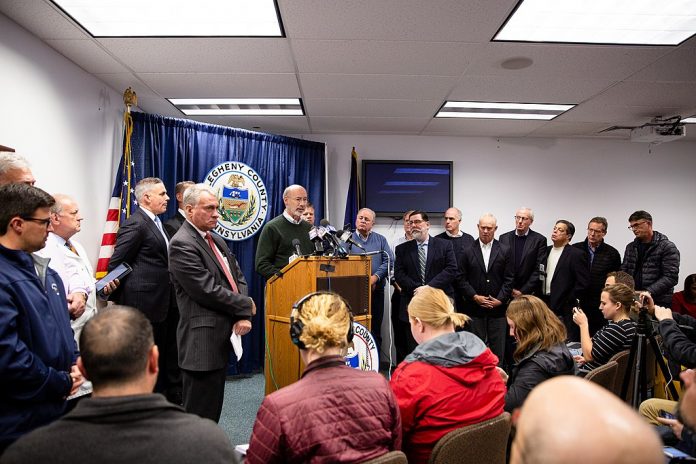The murder of eleven people at the Tree of Life Synagogue was horrific. The killer was a vicious anti-Semite who had proclaimed that “all Jews must die.” These killings are a terrible blew to the Squirrel Hill community in Pittsburgh, all Jewish Americans, and indeed our entire country. It also feels like a turning point for American Jews and for the slowly unfolding civil conflict in the US. The killings came only days after bombs were sent to several high profile critics of President Trump by a deranged supporter of the President. More importantly, it comes following weeks of Republican candidates, pundits and propaganda organizations warning the American people that a shady Jewish billionaire is funding caravans of brown people to invade our country. It also occurred during the presidency of a man who, despite his hawkish support for Israel’s Prime Minister Benjamin Netanyahu campaigned on ancient anti-Semitic themes, has surrounded himself with anti-Semitic advisors and has never spoken out against the anti-Semites who are among his supporters.
Taken together, these developments are leading many Jewish Americans, to ask whether something is changing in this country that has, on balance, been so good to our people for so long. The strong support we have received online and in person from our fellow Americans, including many political, clergy and community leaders has been encouraging, but we still know that anti-Semitism continues to lurk on the sidelines of American politics and have learned just how quickly it can be activated.
It is easy, and necessary, to lay much of this blame on Trump and his right wing supporters, but unfortunately the problem is deeper than that. Countering anti-Semitism, like countering other forms of bigotry, is complicated. For example, just as having a few African American friends does not preclude you from being a racist, strong support for Israel does not preclude a President, other individual, party or movement from being anti-Semitic. In general, discourse about anti-Semitism too frequently gets taken over by discussions of Israel. On the right, support for Israel is viewed as a kind of political get out of jail free card against charges of anti-Semitism, while left-wing criticism of Israel, not always, but too frequently, creates a safe space for anti-Semitism.
The anti-Semitism that motivated the Pittsburgh murderer was not so much about Israel, but drew on older and more powerful anti-Semitic themes about Jews having too much influence, being disloyal to the country where they live and the like. It may be a coincidence, but these are the same themes that the right exploits when they turn George Soros into a bogeyman, repeat the term “globalists,” discuss how “unseen forces” work against “the people” and overstate the impact of American Jews on our financial structures, but it is probably more than coincidence. It is also likely no coincidence that these themes were at the heart of the America First movement in the late 1930s and early 1940s from which Trump has borrowed the slogan for his approach to foreign policy.
Many Jews saw these themes emerging during the 2016 campaign, but they were not broadly acknowledged. Supporters of Trump cited his support for Israel and his daughter’s marriage to Jared Kushner, who is Jewish, and her subsequent conversion to Judaism, as if this constituted unshakable proof that Trump could not be anti-Semitic. The absurdity of these claims notwithstanding, they were to be expected.
Sadly, it was equally predictable that anti-Semitism was left off of so many statements, Tweets and comments about Trump’s bigotry during the campaign and Trump’s presidency. There are reasons for that. None of them are good. It is important to call out bigotry in all forms, even when it is inconvenient. Many of the people who didn’t always mention anti-Semitism in this context were Jews uncomfortable with listing our concerns next to what most people thought were graver threats to other groups. However, most were not Jewish. Some may not have recognized the anti-Jewish elements of Trump’s campaign and his self-proclaimed nationalism, but others may have thought Jews were overreacting or speaking from a position of privilege, so chose not to mention it.
It feels wrong to look at mass killing in Pittsburgh on a quiet Shabbat morning through the lens of the President and the current political climate. Had this event occurred at any other time in the last half century or so, the only mention of the President, any other one than Trump, would have been to praise his appropriately eloquent speech condemning the killings, but things are different in America now. The President indeed made some appropriate remarks, but then he and his supporters pivoted quickly to suggesting the problem was there was no armed guard in the Synagogue. Morever, rather than Trump and his supporters looking at what words and deeds from the Trump movement, might have contributed to an atmosphere where this could have occurred, we got the same angry and nonsensical pledges of Trump’s philo-Semitism.
We don’t know what will happen next. This might be an isolated incident, but we know that in the last two years there has been a rise in anti-Semitic activity in the US, the worst mass killing of Jews in American history and a President who has toyed with anti-Semitic themes and associated with anti-Semites. It is possible that America can still be a welcoming place for Jews. I sure hope that is what happens, but Jewish history tells us that this can change quickly.
www.lincolnmitchell.com
Follow me on Twitter at: http://twitter.com/LincolnMitchell

